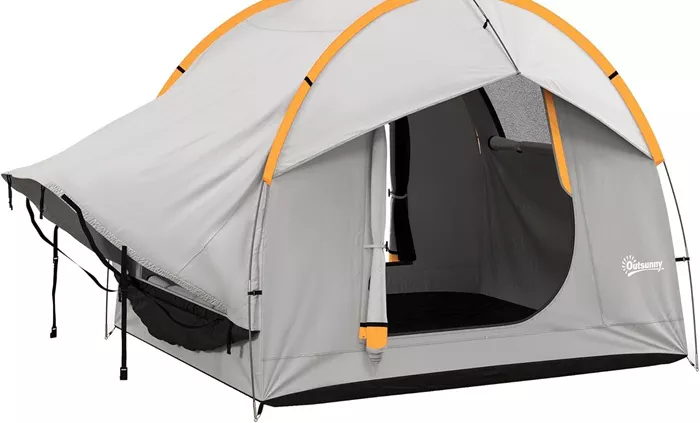When shopping for tents, you’ll often see numbers like 1500mm, 2000mm, or 3000mm. These numbers measure waterproofness. The “mm” stands for millimeters of water pressure the fabric can resist before leaking.
A 2000mm rating means the tent fabric can withstand a 2000mm (about 6.5 feet) column of water before water starts seeping through. This test is done in controlled lab conditions. In real-world use, many factors affect performance.
How Waterproof Ratings Work
Understanding the Test Method
Manufacturers test waterproofness using a standardized method:
- A tube is placed over the fabric
- Water is slowly added to the tube
- The height of water is measured when the first drop penetrates
Higher numbers mean better waterproofing:
- 1000-1500mm: Light rain protection
- 2000mm: Standard for most camping tents
- 3000mm+: Heavy rain or extreme conditions
Real-World Performance Factors
Lab tests don’t tell the whole story. Actual performance depends on:
- Fabric quality and coatings
- Seam sealing
- Tent design and pitch
- Wind conditions
- Duration of rainfall
Is 2000mm Good Enough for Camping?
For Casual Campers
2000mm works well for:
- Summer camping
- Occasional rain showers
- Weekend trips
- Sheltered campsites
Limitations to Consider
You might need higher waterproofing if:
- Camping in heavy rain areas
- Facing prolonged storms
- Using the tent in winter
- Needing maximum protection
Comparing Different Waterproof Ratings
Rating (mm) Suitable Conditions Typical Use
- 1000-1500 Light showers, dew Beach tents, kids play tents
- 2000 Moderate rain 3-season camping tents
- 3000+ Heavy rain, snow 4-season tents, expedition use
Key Features That Affect Waterproofness
Fabric Construction
Most tents use:
- Polyester with PU coating
- Nylon with silicone treatment
- Ripstop fabrics for durability
Seam Sealing Methods
- Tape-sealed (most common)
- Welded seams (more expensive)
- Stitched only (not waterproof)
Additional Protection
Look for:
- Rainfly coverage
- Bathtub floors (higher side walls)
- Waterproof zippers
- Ventilation to reduce condensation
Maintaining Your Tent’s Waterproofing
Proper Care Tips
- Always dry your tent before storage
- Clean gently with mild soap
- Avoid folding the same way each time
- Store loosely in a cool, dry place
Reapplying Waterproofing
Over time, coatings wear off. You can:
- Use spray-on waterproofers
- Apply seam sealer as needed
- Consider professional reproofing
Expert Recommendations
When to Choose 2000mm
Select this rating if you:
- Mostly camp in fair weather
- Want a balance of weight and protection
- Need affordable options
When to Upgrade
Consider higher ratings for:
- Backcountry expeditions
- Frequent rainy weather camping
- Winter or alpine use
Common Myths About Tent Waterproofing
Myth 1: Higher Numbers Always Mean Better
Truth: Beyond 3000mm, gains are minimal for most users. Proper setup matters more.
Myth 2: Waterproof Means 100% Dry
Truth: Condensation can still occur inside any tent.
Myth 3: All 2000mm Tents Perform the Same
Truth: Quality varies between brands and materials.
Conclusion
For most casual and recreational campers, a 2000mm waterproof rating provides adequate protection against typical rainfall. It represents a good balance between cost, weight, and weather resistance. However, serious adventurers or those frequently camping in wet conditions should consider higher-rated options or additional protective measures.
Remember that proper tent maintenance and setup significantly impact real-world waterproof performance, regardless of the rating. Always pair your tent choice with appropriate camping practices for the best experience.
Related topics:
Best Lightweight Pop-Up Tent: A Detailed Guide
Is a 2000mm Tent Waterproof Good?
Is 3000mm Waterproof Good for a Tent?

